Lots of modelling and freedom to explore – summer job in the Acoustics Lab
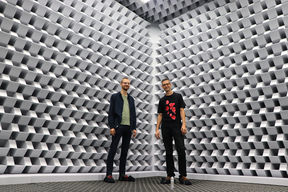
Most of the Aalto University students usually spend their summer away from campus. Rapolas Daugintis and Michael McCrea, master's students in Acoustics and Audio Technology, got to know more about working in the academic world when they got a chance to spend the summer in the Acoustics Lab working on interesting research projects. The School of Electrical Engineering hires tens of students for a range of summer jobs every year.
Have you ever noticed how your voice sounds different when its windy? Rapolas is researching how the wind affects how we hear our own voice. The research is a continuation of Professor Ville Pulkki’s previous research, where he studied how the wind affects how others hear us.
‘Right now, I’m modelling a human head and how the wind affects sound. Anyone can try themselves, for example, when they are cycling on a bridge or some other windy place to shout in different directions and listen to their own voice,’ Rapolas says.
Rapolas worked previously as an acoustics consultant and he thinks it has been interesting to see the difference between the corporate and academic worlds.
‘In general, it has been interesting to get to know how the academic research team works and exchange knowledge with the team; when you are telling someone about your work, they might suggest you to read some research papers or offer their help,’ he continues.
Simulating cocktail parties
Michael’s research project is related to a phenomenon called the “cocktail party effect”, which is used to describe the situation where a person is able to listen the voice he wants even if there are so many different sounds coming from different directions.
‘I’m trying to figure out how we can detect where the sounds are coming from but also isolating the sounds we don’t want to hear. So, right now I am simulating rooms that have multiple sound sources and microphones that are listening to them,’ Michael says.
Michael came to study in Aalto after doing his bachelor’s degree in the Technology and Arts programme in the University of Washington. After finishing his undergraduate studies, he stayed at the university as a research scientist and got more and more interested in sound technology and especially 3D sound.
‘Over the years as I read research papers and tried to implement different techniques, the more and more of them were from Aalto University. Especially the ones that resonated with me the most. It has been meaningful for me to work with the people who wrote those research papers,’ Michael says.
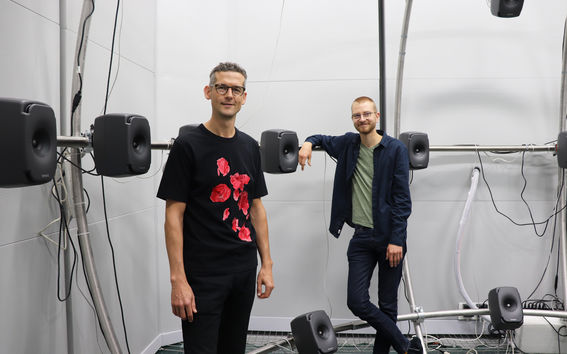
Plenty of room for new research
The research in the field is definitely not done, and the demand for audio technology and acoustics expertise is growing every day. Michael and Rapolas both have lots of topics they find interesting, so what would they like to do in the future?
‘I’m still searching for my exact field of interest but there are interesting topics to research. For example, there is still some research to be done on how we simulate acoustics correctly in different spaces and especially outdoors because it’s such a massive area,’ Rapolas says.
Michael has found his passion in spatial sound and so-called near field. He already has a clear vision of what he would like to study in the future.
‘Because of my background in art, I would like to contribute to making software developments and tools available for artists and designers,’ he says.
Read more
Acoustics and Audio Technology - Computer, Communication and Information Sciences, Master of Science (Technology)
The major in Acoustics and Audio Technology equips students with a fundamental understanding of human hearing, audio perception, and physics of sound. The skills they acquire enable, for example, reducing noise pollution, planning harmonic environments and designing coherent sound experiences.
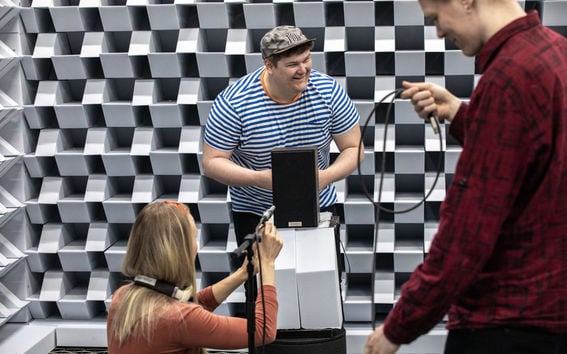
Student Janne Pietilä: Studies in acoustics have also provided new perspectives on musical interests
According to Janne Pietilä, the employment prospects in acoustics and audio technology are good, as experts are needed in virtual reality production as well as in construction
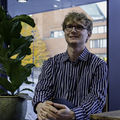
Alumnus Craig Rollo has the music enthusiastic’s dream job
Because Craig Rollo wanted a job related to music, studying Acoustics and Audio Technology was the perfect choice for him
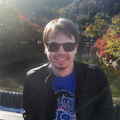
- Published:
- Updated:
Read more news

Aalto in 2024: Love pictured in the brain, wooden crystals that make fashion shine, recovering minerals from wastewater and more
This year has been another feast of science and art at Aalto University
Pengxin Wang: The internship was an adventure filled with incredible research, unforgettable experiences, and lifelong friendships.
Pengxin Wang’s AScI internship advanced AI research, fostered global friendships, and inspired his journey toward trustworthy AI solutions.
Major grant from the Kone Foundation for modern architecture research - Laura Berger's project equates building loss with biodiversity loss
Aalto University postdoctoral researcher Laura Berger and her team have been awarded a 541 400 euro grant from the Kone Foundation to study the effects of building loss on society and the environment.